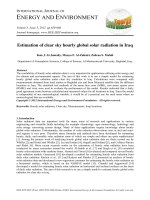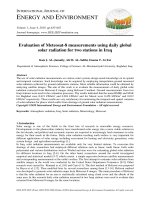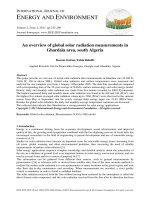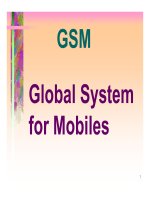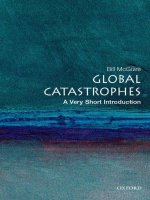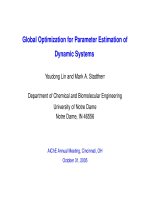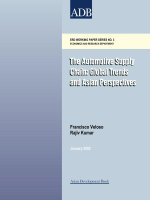global tourism
Bạn đang xem bản rút gọn của tài liệu. Xem và tải ngay bản đầy đủ của tài liệu tại đây (3.02 MB, 590 trang )
TeAM
YYeP
G
Digitally signed by TeAM
YYePG
DN: cn=TeAM YYePG,
c=US, o=TeAM YYePG,
ou=TeAM YYePG,
email=
Reason: I attest to the
accuracy and integrity of
this document
Date: 2005.05.13
21:59:54 +08'00'
Global TourismGlobal Tourism
Third edition
Edited by William F. Theobald
AMSTERDAM • BOSTON • HEIDELBERG • LONDON
NEW YORK • OXFORD • PARIS • SAN DIEGO
SAN FRANCISCO • SINGAPORE • SYDNEY
Butterworth–Heinemann is an imprint of Elsevier
Copyright © 2005. Elsevier Inc. All rights reserved.
No part of this publication may be reproduced, stored in a retrieval system, or transmitted
in any form or by any means, electronic, mechanical, photocopying, recording, or otherwise,
without the prior written permission of the publisher.
Recognizing the importance of preserving what has been written. Elsevier-Science prints its
books on acid-free paper whenever possible.
Library of Congress Cataloging-in-Publication Data
Global tourism / William F. Theobald.—3rd ed.
p. cm.
Includes bibliographical references (p. ).
ISBN 0-7506-7789-9 (alk. paper)
1. Tourism. I. Theobald, William F., 1934–
G155.A1G49 2004
338.4¢791—dc22
2004050270
British Library Cataloguing-in-Publication Data
A catalogue record for this book is available from the British Library.
The publisher offers special discounts on bulk orders of this book.
For information, please contact:
Manager of Special Sales
Elsevier Science
200 Wheeler Road
Burlington, MA 01803
ISBN: 0-7506-7789-9
For information on all Butterworth-Heinemann/Elsevier publications visit our website at:
10987654321
Printed in the United States of America
Contents
Foreword ix
Preface xi
List of Contributors xv
Part One: Clarification and Meaning: Issues of Understanding 1
1 The Meaning, Scope, and Measurement of Travel
and Tourism 5
William F. Theobald
2 What Are Travel and Tourism: Are They Really an Industry? 25
Thomas Lea Davidson
3 Nostalgia in the Noughties 32
Graham M.S. Dann
4 From Competition to Collaboration in the Tourism Industry 52
Alan Fyall and Brian Garrod
Part Two: Results and Residuals: The Issue of Impacts 75
5 The Positive and Negative Impacts of Tourism 79
Brian Archer, Chris Cooper, and Lisa Ruhanen
6 The Role of Relationships in the Tourist Experience 103
Philip L. Pearce
7 Alternative Tourism: A Comparative Analysis of Meaning
and Impact 123
Donald V.L. Macleod
8 The ‘New Pastoral Industry?’: Tourism
in Indigenous Australia 140
David Mercer
Part Three: Changing Directions: Planning and
Development Issues 163
9 Tourism and Sustainable Development 167
Peter E. Murphy and Garry G. Price
10 Addressing Carrying Capacity Issues in Tourism Destinations
through Growth Management 194
Peter W. Williams and Alison Gill
11 Sustainable Tourism Standards in the Global Economy 213
Xavier Font
12 Stakeholder Involvement in Sustainable Tourism:
Balancing the Voices 230
Donald Getz and Seldjan Timur
13 Ethical Considerations in Sustainable Tourism 248
Simon Hudson and Graham Miller
Part Four: Places and Products: Marketing and
Consumer Issues 267
14 Targeting Segments: More Important than Ever
in the Travel Industry 271
Stanley C. Plog
15 Travel Styles 294
Gordon D. Taylor and Nancy E. Chesworth
16 Empirical Market Segmentation: What You See Is What You
Get 309
Sara Dolnicar
17 Developing Strategic Approaches to Tourism Destination
Marketing: The Australian Experience 326
Bill (H.W.) Faulkner
18 Quality and Sustainability in Established Destinations:
Who Pays? 346
Michael Morgan
Part Five: Bureaucracy and Procedure: Geopolitical and
Policy Issues 363
19 Role of Government Incentives 367
Steven Wanhill
20 Social Identities, Globalisation, and the Cultural Politics of
Tourism 391
Peter M. Burns
21 Interventions and Policy Instruments for Sustainable Tourism 406
Bill Bramwell
22 Exploring the Political Role of Gender in Tourism Research 426
Linda K. Richter
23 Crisis Management in Tourist Destinations 440
Gurhan Aktas and Ebru A. Gunlu
Part Six: People, Places, Things: Alternate Issues 459
24 Tourism, Mobility, and Global Communities: New
Approaches to Theorising Tourism and Tourist Spaces 463
Tim Coles, David Timothy Duval, and C. Michael Hall
25 Globalisation and Emerging Tourism Education Issues 482
Frank M. Go
vi Contents
26 Aging Populations: Trends and the Emergence of
the Nomad Tourist 510
Chris Ryan and Birgit Trauer
27 Trends Underpinning Global Tourism in the Coming Decade 529
Larry Dwyer
Name Index 546
Subject Index 559
Contents vii
Tourism is one of the most remarkable success stories of modern times.
The industry, which began on a massive scale only in the 1960s, has grown
rapidly and steadily for the past 30 years in terms of the income it gen-
erates and the number of people who travel abroad. It has proved to be
resilient in times of economic crisis and shows no signs of slowing down,
despite the uncertainty, caused by the events such as September 11, other
terrorist threats, and even unexpected new illnesses like SARS in the
beginning of the new century.
According to World Tourism Organization data, more than 715 million
people were travelling internationally in 2002, generating more than
US$472 billion in earnings. The outlook for the first decades of the next
century is even more astounding. Our forecasts predict 1.6 billion inter-
national tourists by the year 2020, spending more than US$2 trillion annu-
ally—or US$5 billion every day.
As more and more governments recognise the important role that
tourism can play in generating badly needed foreign exchange earnings,
creating jobs, and contributing to tax revenues, the competition for tourist
spending is becoming ever more intense.
Pressure on national and local governments to rapidly develop their
tourism potential to meet demand and produce benefits, makes it more
essential than ever to plan carefully and consider the human and envi-
ronmental impacts of tourism development.
That is why, as Secretary-General of the World Tourism Organization,
I am pleased to see the serious analysis of the problems and prospects of
the tourism sector as presented in this third edition of Global Tourism: The
Next Decade.
Tourism is an extremely complex endeavour. Not only are huge
amounts of money at stake, we are providing economic incentives for
protecting the natural environment, restoring cultural monuments, and
preserving native cultures. We are, in a small but important way, con-
tributing to understanding among peoples of very different backgrounds.
But, above all, we are in the business of providing a break from the stress
of everyday routine and fulfilling the dreams of leisure travellers.
This book goes a long way toward increasing our understanding about
those dreams and complexities that make up the tourism industry.
Francesco Frangialli
Secretary-General,
World Tourism Organization
This book was the result of a need for such a collection that the editor per-
sonally experienced when attempting to teach a seminar in tourism where
no traditional source books were available. It is intended for anyone who
is or will be engaged in the tourism industry, regardless of his or her par-
ticular field of interest. The work is planned on original lines because the
editor has found in his experience as teacher and author that the needs of
students and practitioners, whether in university or graduate school, in
government or in the private sector, are not met by the usual ‘Introduc-
tion to Tourism’ book. Rather, the need is for a new view of the subject
that ordinary textbooks tend to separate.
This volume draws together the insights of 39 observers commonly con-
cerned with the effects of tourism on contemporary society. The chapters
represent various viewpoints from leading educators and practitioners
from such disciplines as anthropology, economics, environmental science,
geography, marketing, political science, psychology, public administra-
tion, sociology, and urban planning.
The purpose of this book is to present critical issues, problems, and
opportunities facing the tourism industry. Tourism problems are complex
and interrelated and they suggest myriad crises such as overcrowding of
tourist attractions; overuse and destruction of natural resources; resi-
dent–host conflicts; loss of cultural heritage; increased crime and prosti-
tution; inflation and escalating land costs; and a host of other political,
sociocultural, economic, and environmental problems that may be
brought about or exacerbated by tourism development.
The approach taken by this book is not on a particular subject, but rather
the exploration of issues facing those involved in the tourism domain. The
scope of the book provides each chapter as a mini-treatise on tourism, from
an international perspective. Individual chapters scrutinise, reflect upon,
and question the changes and transformations needed. Each chapter pro-
vides an exploration of concerns, issues, assumptions, values, and per-
ceptions, and the reasoning for a view taken by individual authors. The
issues raised in the book will hopefully bring about much needed thought,
discussion, reflection, argumentation, and, perhaps, debate.
It would be patently absurd to claim that this book encapsulates all that
might or should be said about tourism. It should be discerned, however,
that an attempt has been made to present the viewpoints of both those
who look with optimism at tourism and those who scrutinise it with some
skepticism. It has not been a goal to prove any individual point of view
as the ‘right’ one, but rather to examine the phenomena of tourism as fully
as possible.
The impetus for this third edition came in large measure from the
extremely helpful and highly positive reviews of the first book from the
following individuals and publications: Derek Hall, Tourism Management;
Paul F. Wilkinson, Annals of Tourism Research; Jonathan Goodrich, Journal
of Travel Research; J.R. McDonald, Choice Magazine; John Joseph Courtney,
Journal of Vacation Marketing; and reviewer unknown, Future Survey. Now,
allow me turn to those whose special individuals whom I sincerely wish
to recognise and thank.
It would not be possible to have undertaken this project without the
love, support, and total commitment of my wife, Sharon. Thank you for
being by my side through the years. To my children, Gregg and Amanda,
may your lives be filled with as much happiness as you have given me
over the years.
As editor I wish to acknowledge the contribution of Brian Archer, who
not only provided encouragement to undertake this project, but also ini-
tially recommended it to the publisher, Butterworth-Heinemann. Thanks
are also extended to my colleagues at Purdue University (U.S.), the Uni-
versities of Surrey (U.K.), and Waterloo (Canada) for the many opportu-
nities they provided that helped expand my view of tourism as an
international phenomena.
Acknowledgement is made of both the World Tourism Organization
(WTO) and the Travel and Tourism Research Association (TTRA) who
granted permission to reproduce selected portions of previously pub-
lished materials. The editor is indebted to Francesco Frangialli, Secretary-
General of the WTO, who generously agreed to write the introduction to
the book and to Rok V. Klancnik, Chief, Press & Communications, of the
WTO, for his kindness and logistical assistance.
This book has been translated into three additional languages: Japan-
ese, Portugese, and Chinese. I wish to thank Professor Kazuhiko Tama-
mura of Doshisha University for his excellent translation into Japanese
(by Koyo Shobo), the China Travel and Tourism Press for the Chinese
edition, and Editora Senac for the Portuguese translation.
The editor wishes to thank Kathryn Grant, Publishing Director (Busi-
ness Books), and Sally North and Jane MacDonald, editors at Butterworth-
Heinemann, for their enthusiastic support of the idea underlying this
book and their cogent suggestions throughout its compilation. In addi-
tion, the publisher’s editorial staff is acknowledged for their help with the
completed manuscript.
The editor wishes to acknowledged the contribution of those individ-
uals who having adopted the book for their classes so generously pro-
vided constructive criticism of the text in order to strengthen this the third
edition.
xii Preface
Finally, a specific note of appreciation is extended to the contributors to
this volume for their wholehearted efforts in bringing their knowledge,
ability, experience, and expertise to the task at hand. It was an exhilarat-
ing experience working with them. I am indebted to them, and I am also
quite proud to count them as colleagues.
William F. Theobald
Purdue University
West Lafayette, Indiana
Preface xiii
Brian Archer is Professor Emeritus and former pro-Vice-Chancellor at the
University of Surrey (U.K.), where previously he was Head of the Depart-
ment of Management Studies for Tourism and Hotel Industries. Prior to
joining the University of Surrey in 1978 he was Director of the Institute
of Economic Research at the University College of North Wales, Bangor.
He has degrees in Economics (University of London), Geography (Uni-
versity of Cambridge), and a Ph.D. (University of Wales), and is a Fellow
of the Tourism Society and of the Hotel, Catering and Institutional Man-
agement Association
Gurhan Aktas is a Researcher in the Department of Tourism Manage-
ment, Faculty of Business, T.C. Dokuz Eylul University, Izmir, Turkey, and
is also a Ph.D. candidate at Bournemouth University (U.K.), working on
a thesis titled, Marketing Cities for Tourism: Developing Marketing Strategies
for Istanbul with Lessons from Amsterdam and London. His main research
interests lie in tourist destinations with a particular focus on urban
tourism, visitor attractions, tourism marketing, and tourism development
and planning. He has written articles and conference papers on topics
including tourism and environmental issues, tourist attractions in urban
areas, the importance of lifetime education in tourism, and marketing city
destinations.
Bill Bramwell is Reader in Tourism at the Centre for Tourism and
Cultural Change at Sheffield Hallam University (U.K.). He has a Masters
Degree in Geography from Cambridge University and a Ph.D. from the
University of London. He formerly worked for the English Tourist Board,
where he developed local tourism development programmes in various
parts of England and he was responsible for the Board’s rural tourism
policies. Author of many articles in academic tourism journals, Dr.
Bramwell is cofounder and coeditor of the Journal of Sustainable Tourism.
He is coeditor of the books Rural Tourism and Sustainable Rural Develop-
ment (1994), Sustainable Tourism Management: Principles and Practice (1998),
and Tourism Collaboration and Partnerships: Politics, Practice and Sustainabil-
ity (2000), as well as sole editor of Coastal Mass Tourism: Diversification and
Sustainable Development in Southern Europe (2003). His research interests
include the relations between tourism and growth management, local
communities, actor networks, politics and governance, discourses of
sustainability, and globalisation.
Peter M. Burns is the Director of the Center for Tourism Policy Studies
(CENTOPS), University of Brighton, and Professor of International
Tourism and Development. He has published on a wide range of social
and planning matters including a book on tourism and anthropology. His
teaching and research interests include the social dynamics of tourism
with a burgeoning interest in the use of visual evidence in analysing
tourism. As well as his academic work, Dr. Burns holds an active tourism
planning consultancy portfolio with both public and private sector clients
including the United Nations Development Program (UNDP), the WTO,
and the European Union (EU). Dr. Burns sits on the WTO Education
Council and is Founding Chair of the Association of Leisure and Tourism
Studies (ATLAS) Social Identities Group.
Nancy E. Chesworth is Assistant Professor in the Department of Business
and Tourism and Hospitality Management, Mount St. Vincent University.
She holds a Masters in Tourism Planning and Administration from the
George Washington University and received her doctorate in Man-
Environment Relations from the Pennsylvania State University. Her
diverse background includes studies in business, psychology, history, and
education. She teaches graduate level planning and development,
contemporary tourism issues, and international tourism. Her research
interests include ecotourism, travel styles, tourist/host relations, and
behaviour and marine and community tourism. She has conducted an
ecotourism assessment of Mount Makiling in the Philippines, fieldwork
on several Caribbean Islands, and community tourism development pro-
jects in Nova Scotia. Her consulting activities include involvement in a
quality service assessment of resorts and visitor information centres for
the province of Nova Scotia, and the impact of a historical reenactment
event at Fortress Louisbourg.
Tim Coles is Business Research Fellow in Tourism and Lecturer in Human
Geography in the School of Geography, Archaeology and Earth Resources
at the University of Exeter in the United Kingdom. He is currently the
Honorary Secretary of the Geography of Leisure and Tourism Research
Group of the Royal Geographical Society (with Institute of British Geog-
raphers). His principal research interests surround the relationships
between tourism production and consumption and the restructuring of
society, economy, and polity, not least in central and Eastern Europe where
he has worked extensively. His recent publications include (with Dallen
Timothy) Tourism, Diasporas and Space (London: Routledge, 2004), and he
is currently working (with Andrew Church) on a volume dealing with the
connectivities between Tourism, Power and Place (London: Routledge,
2004).
xvi List of contributors
Chris Cooper is Foundation Professor of Tourism Management in the
School of Tourism and Leisure Management, Faculty of Business Eco-
nomics and Law, The University of Queensland, Australia. He has an
honours degree and Ph.D. from University College London and before
beginning an academic career he worked in market planning for the
tourism and retail sectors in the United Kingdom. Chris Cooper has
authored a number of leading textbooks in tourism and worked closely
with the WTO in developing the status of tourism education on the inter-
national stage. He is coeditor of Current Issues in Tourism, editor for a
leading tourism book series, Aspects of Tourism, author of many academic
papers in tourism and has worked as a consultant and researcher in every
region of the world.
Graham M.S. Dann is Professor in Tourism at the University of Luton
(U.K.). A native of Edinburgh, he obtained his doctorate from the Uni-
versity of Surrey (U.K.) and lectured in sociology at the University of the
West Indies (Barbados). Professor Dann is the author of seven books and
over seventy refereed articles. He is an associate editor of Annals of Tourism
Research, a founding member of the International Academy for the Study
of Tourism, and President of the Research Committee on International
Tourism of the International Sociological Association. His research inter-
ests in tourism focus principally on motivation and the semiotics of pro-
motion, brought together in his latest book, The Language of Tourism (1996).
Thomas Lea Davidson was, until his death, Principal and CEO of
Davidson-Peterson Associates, Inc., a company he founded with Karen
Ida Peterson. A full-service marketing research and strategic planning
consulting company based in York, Maine (U.S.), they specialise in the
travel, tourism, accommodations, meetings and conventions, entertain-
ment, and recreation marketplace. Formerly, he was Executive Vice
President of Davidson-Lasco, and Oxtoby-Smith, Inc. He was an adjunct
faculty member at several universities including Northwestern and
Connecticut (U.S.) where he was also Associate Director of Graduate
Studies in Business. Mr. Davidson was a member of the editorial board of
the Journal of Travel Research, and the U.S. Department of Commerce Task
Force on Assessment Research Methods (Performance Accountability). A
past national chairperson, board member, and committee chair of the
Council of American Survey Research Organizations (CASRO), he
also chaired the Certification Committee of the Association of Travel
Marketing Executives.
Sara Dolnicar is a Senior Lecturer at the School of Management, Market-
ing & Employment Relations at the University of Wollongong. She com-
pleted her Masters degree in Psychology at the University of Vienna and
List of contributors xvii
her Masters/Ph.D. degree in Business Administration at the Vienna Uni-
versity of Economics and Business Administration, where she worked as
an Assistant Professor at the Institute for Tourism and Leisure Studies.
During this period she also acted as Secretary General of the Austrian
Society for Applied Research in Tourism. In her Ph.D. thesis she compared
neural networks with traditional algorithms for behavioural market seg-
mentation. Her subsequent contributions include conceptual and method-
ological contributions in the area of a posteriori market segmentation,
development of perceptions-based market segmentation (PBMS), and
investigation of specific market segments among tourists and critical
reviews of cluster–analysis–based segmentation studies. Most of these
contributions resulted from interdisciplinary teamwork in the Research
Centre ‘Adaptive Modelling and Information Systems in Economics and
Management Science,’ a joint endeavour of three Viennese universities
funded by the Austrian Research Foundation.
David Timothy Duval is a Lecturer in the Department of Tourism at the
University of Otago in New Zealand. A formally trained archaeologist
(having worked in the Caribbean in the early 1990s), David holds gradu-
ate degrees in Anthropology and Tourism and Development. David’s
primary research interests incorporate the social aspects of international
migration and return migration, including the resulting transnational
social relations, networks of cultural ties, and the impact of technology on
movement and identity. Following ethnographic fieldwork conducted
in Toronto, he has written extensively on migration from the Eastern
Caribbean to Canada. He is the editor of Tourism in the Caribbean: Trends,
Development, Prospects (London: Routledge, 2004) and is coeditor (with
C.M. Hall and D.J. Timothy) of Safety and Security in Tourism: Relationships,
Management, and Marketing (Haworth Press, 2004).
Larry Dwyer is Qantas Professor of Travel and Tourism Economics at the
University of New South Wales. He publishes widely in the areas of
tourism economics and tourism management with over 150 publications
in international journals, government reports, chapters in books, and
monographs. Dr. Dwyer maintains strong links with the tourism indus-
try internationally and domestically. He has worked with the WTO in
tourism strategy development in India and the National Centre for Devel-
opment Studies in researching the economic impacts of tourism in the
Pacific. He has also served as contracted consultant to the Australian
government advising on the economic impacts of government policies on
the tourism industry and has recently provided expert testimony to the
tourism industry in its submission to the Australian government’s Ten
Year Plan for the tourism industry. Dr. Dwyer is on the Editorial Board of
six international tourism journals.
xviii List of contributors
Bill (H.W.) Faulkner was until his untimely death the Director of the
Centre for Tourism and Hotel Management Research at Griffith Univer-
sity, Gold Coast (Australia). Former positions held included founding
Director of the Australian Bureau of Tourism Research, senior policy
research positions in the Australian Government’s tourism and transport
administrations, and an academic position at Wollongong University. Dr.
Faulkner served on the editorial boards of several international tourism
research journals, including Tourism Management, Journal of Tourism
Studies, Pacific Tourism Review, Turizam, and Anatalia. His doctoral research
was conducted in the Research School of Pacific Studies at the Australian
National University, while undergraduate studies were completed at the
University of New England.
Xavier Font is Principal Lecturer in Tourism Management at Leeds
Metropolitan University. He has degrees in tourism management and
marketing from the University of Girona (Spain) and Surrey (U.K.).
Formerly he lectured at Buckinghamshire Chilterns University College
and was Project Officer for an EU project on forest tourism. His research
focusses on standard setting and certification of sustainable tourism and
hospitality. He has coauthored and coedited four books and published in
a variety of academic journals, including recent papers in Annals of
Tourism Research, Tourism Management, Journal of Sustainable Tourism, and
Corporate Social Responsibility and Environmental Management. In the last
five years he has undertaken research and consultancy for UNEP, WTO,
Ford Foundation, Travel Foundation, and WWF International, Germany
and Netherlands.
Alan Fyall is Senior Lecturer in Tourism Marketing at the International
Centre for Tourism & Hospitality Research, Bournemouth University. His
interests are in heritage tourism and visitor attractions, tourism market-
ing, and interorganisational collaboration in tourism. He has published
widely in journals, written a large number of book chapters, and has con-
tributed to a number of professional publications. In addition, Alan was
lead editor of the book Managing Visitor Attractions: New Directions and
has recently completed authoring the book Tourism Marketing: A Collabo-
rative Approach with Brian Garrod. Alan is a consultant editor for the
International Journal of Tourism Research and resource editor for Annals of
Tourism Research, both in the area of tourism marketing. Alan has travelled
widely and has worked as a consultant for a number of large organisa-
tions including, in the United Kingdom, the former British Tourist
Authority and the London Development Agency.
Brian Garrod is Senior Lecturer in Rural Economics and Tourism at the
Institute of Rural Sciences, University of Wales, Aberystwyth. He holds a
List of contributors xix
Ph.D. from the University of Portsmouth. His interests are in sustainable
tourism, visitor attractions, and tourism marketing, and he has published
numerous journal articles and book chapters in these areas. He has also
written a number of books, including most recently Managing Visitor
Attractions: New Directions, published by Butterworth-Heinemann (with
Alan Fyall and Anna Leask) and Marine Ecotourism: Issues and Experiences,
published by Channel View (with Julie C. Wilson). He is an associate
editor of the Journal of Ecotourism and an editor of Tourism in Marine Envi-
ronments. He has worked as a consultant on tourism and environmental
management issues to the WTO, the OECD, and the Countryside Agency.
Donald Getz is Professor of Tourism and Hospitality Management,
Haskayne School of Business, at the University of Calgary. Previously he
was on the faculty at The University of Waterloo, and early in his career
he worked as a city and regional planner in Ontario. He holds degrees
from the University of Waterloo, (Bachelor of Environmental Studies in
Urban and Regional Planning), Carleton University (Master of Arts, Geog-
raphy), and the University of Edinburgh, in Scotland (Ph.D. in Social
Sciences–Geography). His books include Festivals, Special Events, and
Tourism (1991), Event Management and Event Tourism (1997), and Explore
Wine Tourism (2001). He has also coedited The Business of Rural Tourism
and recently completed a new book to be published by CABI titled, The
Family Business: Tourism and Hospitality. Dr. Getz cofounded, and until
recently was Editor-in-Chief of Festival Management and Event Tourism: An
International Journal, and recently was renamed Event Management. He
also serves on the editorial board of several international tourism journals
including Tourism Management.
Alison Gill is a Professor in the Department of Geography at Simon
Fraser University and is also a member of the Centre for Tourism Policy
and Research. Her research interests are closely aligned to the study of
single industry and small community development processes and issues.
Dr. Gill currently focusses her research in areas related to the planning
and development processes used in resort communities.
Frank M. Go currently holds the Bewetour Chair of Tourism Management
at the Rotterdam School of Management at the Erasmus University, the
Netherlands. Prior to that he served within business faculties at univer-
sities in Canada and Hong Kong. He received his doctorate from the Uni-
versity of Amsterdam where his dissertation concentrated on strategy and
structure. His current research interest is on the coevolution of tourism
marketing and information and communication management.
Ebru A. Gunlu is a Research Fellow at the Department of Tourism Man-
agement, Faculty of Business, T.C. Dokuz Eylul University, Izmir, Turkey,
xx List of contributors
where she has recently completed her Ph.D. thesis titled The Interaction
Between Conflict Management and Organizational Culture in the Hospitality
Industry. Her main research interests lie in the application of managerial
issues and behavioural sciences to the hospitality industry. She has
written articles and conference papers on topics including barter as a
means to increase sales in the hospitality industry, importance of time
management in the hospitality industry, and factors affecting communi-
cation in the hospitality industry. She is currently cowriting a book on
convention management.
C. Michael Hall is a Professor in the Department of Tourism, School of
Business, University of Otago, New Zealand, and Honorary Professor,
Department of Marketing, University of Stirling, Scotland. His Doctorate
was from the University of Western Australia and Masters from the
University of Waterloo, Canada. As at the time of writing he was also
coeditor of the journal Current Issues in Tourism and Chairperson of the
International Geographical Union’s Commission on Tourism, Leisure and
Global Change. He has published widely on topics related to tourism,
regional development, heritage, wilderness, food, and wine.
Simon Hudson is an Associate Professor in the Tourism Management
Area at the University of Calgary. Prior to working in academia, he spent
several years working for U.K. tour operators, and also ran his own suc-
cessful business for eight years. He has lectured and consulted in many
aspects of tourism, but specialises in the marketing of tourism. His
research is focussed on sports tourism, and he has published numerous
journal articles and book chapters from his work. He has written three
books, the first two titled Snow Business and Sport & Adventure Tourism.
His latest book titled Tourism & Hospitality Marketing: A Canadian Perspec-
tive was published by Nelson Thomson in 2004. He is on the editorial
boards of the International Journal of Tourism Research, Journal of Teaching in
Travel & Tourism, and the Journal of Travel Research.
Donald V.L. Macleod is a Research Fellow and Director of the Crichton
Tourism Research Centre at the University of Glasgow, Scotland Previ-
ously he was a Research Associate at the University of Oxford, and Visit-
ing Professor in Cultural Anthropology at Macalester College, U.S. He has
also tutored Social Anthropology at both Oxford and London Universities.
He graduated from the University of Oxford in 1993 with a D.Phil. in Social
Anthropology. It was during research for his doctorate that he developed
an interest in tourism whilst working in the Canary Islands. Dr. Macleod
has coedited Tourists and Tourism: Identifying With People and Places, and
recently he edited Niche Tourism in Question, and authored Tourism,
Globalisation and Cultural Change, both published in 2003. He has also
List of contributors xxi
published widely in academic journals and contributed numerous chap-
ters to edited collections on the issues of identity, power, culture, change,
national parks, and branding, based in different regions including the
Dominican Republic, the Canary Islands, and Scotland.
David Mercer has degrees from Cambridge University and Monash Uni-
versity in Melbourne, Australia. He is currently Associate Professor in the
School of Social Science & Planning, RMIT University, in Melbourne
where he coordinates the Master of Social Science (International Urban
and Environmental Management) Program. Prior to moving to RMIT in
2002 he was Associate Professor in the School of Geography & Environ-
mental Science at Monash University, where he taught for more than
30 years. Dr. Mercer is an elected Fellow of the Environment Institute of
Australia and New Zealand and is the author of over 130 publications
on many issues in the general area of social science and natural resource
management, mainly with a focus on Australia. His most recent book
(2000) is A Question of Balance: Natural Resource Conflict Issues in Australia
(Sydney: The Federation Press). Recent papers have appeared in such
journals as Citizenship Studies, The Australian Geographer, Urban Studies,
and Annals of Tourism Research.
Graham Miller is a lecturer in management at the University of Surrey,
England. His primary research and teaching interests lie in sustainable
tourism and in particular, assessing the reasons why tourism organisa-
tions adopt a sustainability agenda. This has led to examinations of the
attitudes of tourism experts to indicators of sustainable tourism, tourism
companies to corporate responsibility, consumers to sustainable tourism
products, and the role of financial institutions in promoting greater sus-
tainability in the companies they invest in. In addition, Dr. Miller has also
considered the moral approach to sustainable tourism through research
into the level of ethical awareness and orientation of tourism practi-
tioners. Related research has explored the accessibility of tourism
establishments in the United Kingdom for the disabled consumer and
the adherence of the industry with the recent Disability Discrimination
Act, also to consider the role of charities within the tourism industry.
Michael Morgan is a Senior Lecturer in Tourism Marketing at
Bournemouth University, U.K., where he is Course Tutor of the M.A. in
European Tourism Management. He is the author of Marketing for Leisure
and Tourism (1996) and has published articles on resort management, tour
operations, and tourism education. Before becoming an academic, he
worked in marketing management and tour operations for cross-channel
ferries.
xxii List of contributors
Peter E. Murphy is the foundation professor and Head of the La Trobe
University School of Tourism and Hospitality. He is a recipient of the Roy
Wolfe Award for research in tourism in North America and is a member
of the International Academy for the Study of Tourism. He has published
or edited 7 books and over 60 articles relating to tourism. Professor
Murphy was an active member of the Tourism B.C. strategic plan task
force and was the facilitator and chairperson for the creation of Tourism
Victoria, the destination association for Victoria, B.C., Canada. He later
was elected to the Board of Tourism Victoria, B.C., where his principal
functions were to chair its development committee and to conduct its
annual visitor exit surveys. He has assisted Tourism Victoria, Australia,
in the development of its new strategic plan and he currently serves on
the board of Bendigo Tourism. Dr. Murphy’ books include Strategic Man-
agement for Tourism Communities: Bridging the Gaps (Clevedon: Channel
View Press), forthcoming book (with Ann Murphy) and Tourism: A Com-
munity Approach (London: Routledge, 1985).
Philip L. Pearce holds a Doctorate from the University of Oxford, U.K.,
and is the Foundation Professor of Tourism at James Cook University,
Townsville, Queensland, Australia. He has held a Fulbright scholarship
to Harvard University and is the Editor of The Journal of Tourism Studies.
He has long-standing interests in tourist behaviour and has authored
numerous articles and several books including The Social Psychology of
Tourist Behaviour (1982), The Ulysses Factor (1988), Tourism Community Rela-
tionships (1996), and Tourism: Bridges Across Continents (1998). He is cur-
rently working on a new book on tourist behaviour. He is a Foundation
member of the International Academy for the Study of Tourism, a found-
ing Vice-President of the Asia Pacific Tourism Association, and an Hon-
orary Professor of X’ian International studies, University, X’ian, China.
Stanley C. Plog has more than 35 years of experience in travel and
tourism research. He founded Plog Research and currently directs his own
consulting service (SPC Group) and has completed assignments for
virtually every segment of the travel industry. With a doctorate from
Harvard University, he began his professional career at UCLA as Acade-
mic Director of the Social Psychiatry programme and later founded a
research centre focussing on urban social problems. He has written or
coauthored seven books, including Leisure Travel: A Marketing Handbook
(Prentice Hall, 2003), Vacation Places Rated (Fielding, 1995), and Leisure
Travel: Making It a Growth Market Again (John Wiley & Sons, 1991). He has
written regular columns for industry publications such as Travel Weekly,
ASTA Agency Management, and Travel Counselor. He has written numerous
articles for academic books and professional journals on travel and
tourism, and also on research methods and procedures. Dr. Plog is an
List of contributors xxiii
